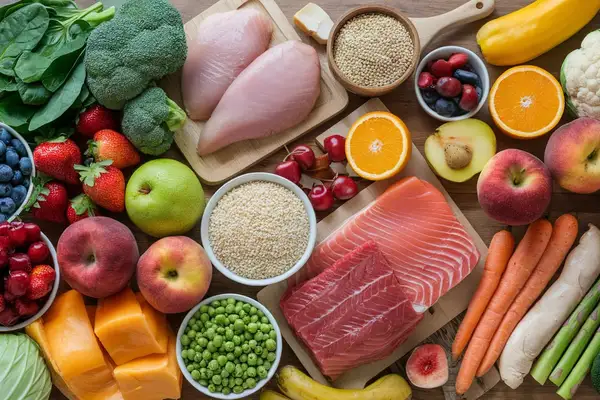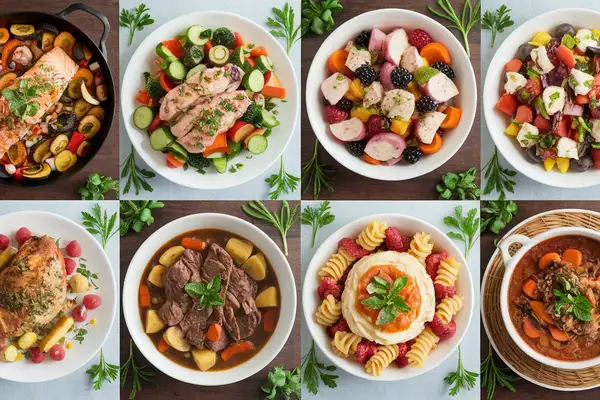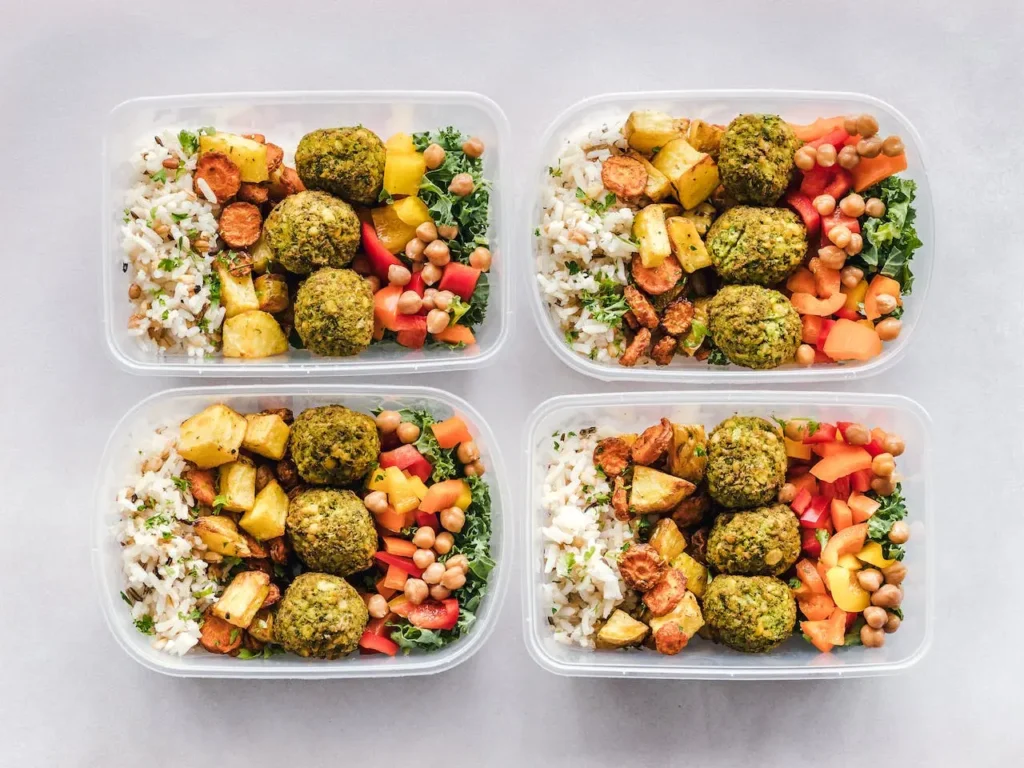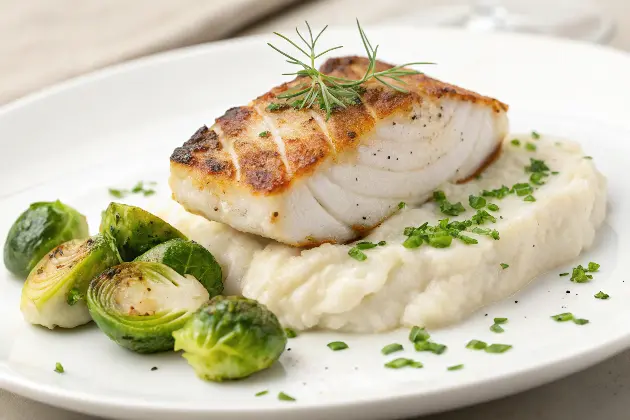7-Day Meal Plan for Pregnant Women: Iron Rich Pregnancy Meals
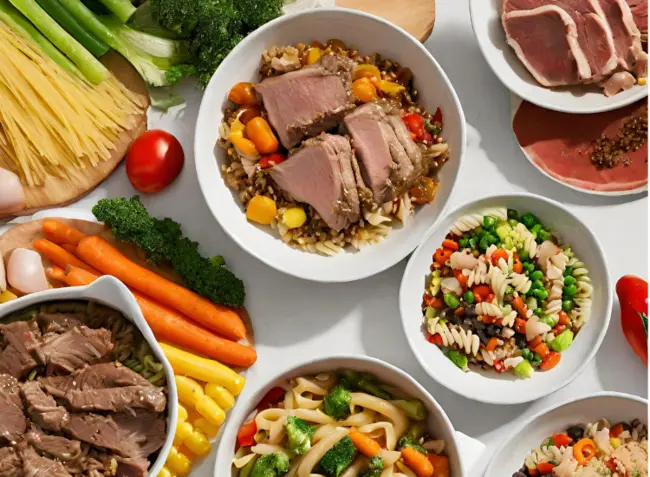
This post may contain affiliate links, meaning I may earn a commission if you make a purchase, at no extra cost to you. I only recommend products I trust. Thank you for your support.
Expectant or pregnant women often prioritize their health and well-being, and one crucial aspect of that is maintaining a healthy diet.
A 7-day meal plan for pregnant women can help reduce the risk of complications, provide the necessary nutrients for the baby’s growth, and support the mother’s energy levels.
This 7-day meal plan for pregnant women includes foods that fight nausea during pregnancy while prioritizing nutrient-rich foods essential for maternal health.
Additionally, this pregnancy meal plan outlines foods to avoid during pregnancy to promote the mother’s well-being and the baby’s development.
By following a pregnancy diet, expectant mothers can ensure they are getting all the essential nutrients they need.
Nutritional Requirements for Pregnant Women
During pregnancy, the body’s nutritional needs increase to support the growth and development of the baby. It is essential to consume a variety of foods to ensure an adequate intake of key nutrients.
Here are some important nutrients essential for pregnant women:
- Folic Acid: Crucial for fetal development, folic acid helps prevent neural tube defects. Leafy greens, legumes, and fortified cereals are excellent sources.
- Iron: Required for the production of red blood cells, iron helps prevent anemia. Include lean meats, poultry, fish, legumes, and dark leafy greens in your diet.
- Calcium: Important for the development of the baby’s bones and teeth, calcium is found in dairy products, fortified plant-based milk, tofu, and leafy greens.
- Protein: Essential for the growth of the baby’s tissues, include lean meats, fish, poultry, eggs, dairy products, legumes, and nuts in your meal plan.
- Omega-3 Fatty Acids: Important for brain development, include fatty fish, flaxseeds, chia seeds, and walnuts in your diet.
- Vitamin D: Necessary for calcium absorption and bone health, spend time in the sun and consume fortified dairy products, mushrooms, and fatty fish.
- Vitamin C: Aids in the absorption of iron, include citrus fruits, berries, tomatoes, and bell peppers in your meals.
7-Day Meal plan for Pregnant Women
This 7-day meal plan for pregnant women features iron rich foods, delicious iron rich recipes, and healthy pregnancy meals for breakfast, lunch, and dinner.
This high iron pregnancy diet focuses on avoiding potentially harmful foods and emphasizes pregnancy super foods that can help combat pregnancy-related nausea.
Here’s is a carefully designed pregnancy meal plan:
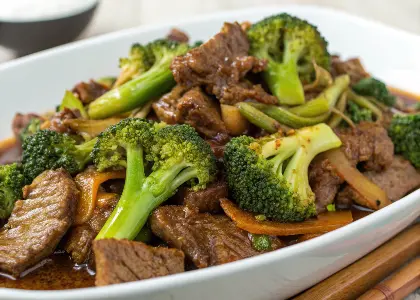
Day 1
Breakfast:
- Whole grain toast with 2 tablespoons of cottage cheese, fresh tomato slices, and chives. (1 slice whole wheat toast)
- 1 glass (8 oz) of 1% milk
Lunch:
- Mixed bean salad with diced carrot, celery, bell pepper, and avocado with your choice of tinned fish for protein (1 cup of mixed bean salad, 1/4 avocado, 3-4 oz of tinned fish)
Dinner:
- Stir-fried beef with broccoli, garlic, and soy sauce over brown rice (1 serving, 1 cup of brown rice)
Snacks:
- 2 hard-boiled eggs on whole wheat pita
- Greek yogurt with fresh fruits and nuts (1 serving)

Day 2
Breakfast:
- Baked oatmeal with Greek yogurt, banana, blueberries, eggs, cinnamon, and honey (1 serving of oatmeal and Greek yogurt, 1 egg)
Lunch:
- Slow-cooked chicken soup, chickpeas, carrots, celery, and spinach in a savory broth (1 serving, 1 bowl)
- Quinoa salad with chickpeas, cucumbers, tomatoes, and feta cheese (1/2 cup quinoa, 1/2 cup chickpeas, assorted veggies, 1 oz feta cheese)
Dinner:
- Extra-lean ground beef meatloaf, baked asparagus, broccoli with garlic, and sweet potatoes (4-6 oz per serving of ground beef, 4-6 spears of asparagus)
Snacks:
- Tuna fish and whole grain crackers (1 serving of tuna, 4-5 whole grain crackers)
- Cottage cheese with fresh fruits and nuts
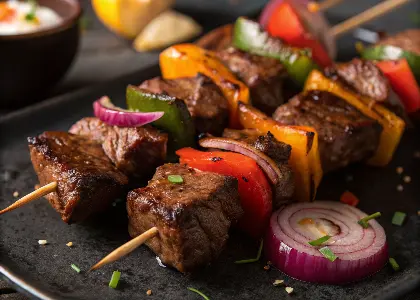
Day 3
Breakfast:
- High-fiber cold cereal with fresh fruits, mixed nuts, milk, and Greek yogurt (1 serving of cereal and Greek yogurt, 1 cup of milk)
Lunch:
- Baked flatbread pizza with whole grain pita bread with feta cheese (1 medium-sized pizza, 1 oz feta cheese)
- Roasted chicken breast with roasted bell peppers (4 oz chicken breast)
Dinner:
- Grilled beef kebabs with bell peppers, onions, and a side of tzatziki sauce (2 oz lean beef per skewer)
- Brown rice, fresh green salad, and your favorite dressing (1/2 cup of brown rice)
Snacks:
- Fresh vegetables with dip and cheese
- Greek yogurt with fresh fruits and nuts (1 serving)
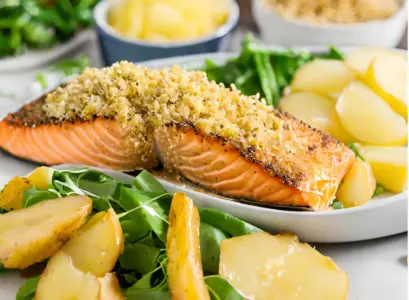
Day 4
Breakfast:
- Overnight oats with chia seeds, banana slices, crushed peanuts, and dark chocolate nibs (1 serving, 1 medium banana)
Lunch:
- Chickpea curried stew with canned tomatoes, potato, carrots, cauliflower, onion, and garlic, served with 1 whole-grain naan (1 serving)
Dinner:
- Baked salmon crusted with panko crumbs and honey mustard, boiled potatoes, and a fresh salad (4 oz salmon, 1-2 potatoes)
Snacks:
- Avocado dip with whole grain crackers (4-5 whole grain crackers)
- Fresh apple with nut butter (1 medium apple)
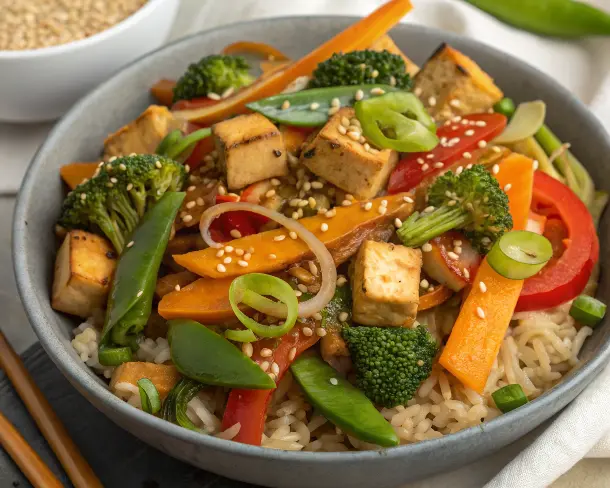
Day 5
Breakfast:
- Savory egg omelet with cooked bell peppers, black beans, and avocado mash, served with whole-grain toast (1 serving, 1 slice of whole-grain toast)
Lunch:
- Vegetarian sandwich with whole grain bread, lettuce, cucumber, red onion, tomato, and hummus, served with fresh fruit (1 sandwich)
Dinner:
- Stir-fried tofu, bell peppers, carrots, broccoli, snap peas, and sesame seeds over brown rice (1 serving, 1 cup of brown rice)
Snacks:
- Homemade blueberry muffins (2 muffins)
- Fresh-cut vegetables and hummus (1 serving of hummus)
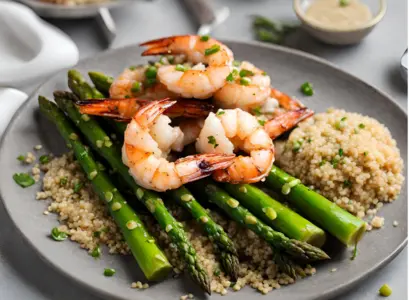
Day 6
Breakfast:
- Whole grain English muffins with egg, avocado, cheese, and baby arugula (1 muffin, 1 egg, 1/4 avocado)
Lunch:
- Shredded salad with kale, Brussels sprouts, sweet onion, blueberries, almonds, feta cheese, and roasted chicken, with your favorite salad dressing (1, serving, 4 oz chicken)
Dinner:
- Stir fry with cabbage, red peppers, onion, fresh mango slices, peanuts, cilantro (1 serving)
- Cooked shrimp, served over brown rice (4 oz shrimp, 1 cup of brown rice)
Snacks:
- Greek yogurt with fresh fruits and nuts (1 serving)
- Whole-grain crackers with tinned salmon and cucumber slices (4-5 whole grain crackers)
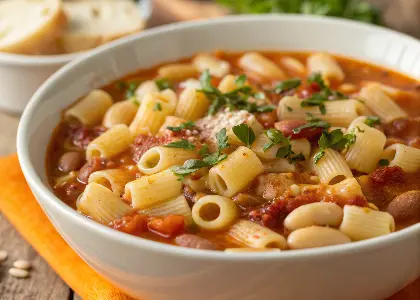
Day 7
Breakfast:
- Avocado toast on whole grain bread topped with cherry tomatoes and feta cheese (1 serving)
Lunch:
- Egg salad pita wraps with spinach and sundried tomato, served with a small vegetable soup (1-2 egg salad pita wraps)
Dinner:
- Pasta E Fagioli, Pasta with white beans, tomatoes, spinach, olives, and a garlic olive oil broth (1 serving, 1 bowl)
Snacks:
- Cottage cheese with fruits and nuts (1 serving of cottage cheese)
- Vegetable sticks with hummus (1 serving of hummus)
Foods to Include in a pregnancy meal plan
When creating a pregnancy meal plan, it’s important to include a variety of iron rich foods, vitamin-c rich foods, folate rich foods, calcium rich foods, and macronutrients.
Here are some key foods to consider including in your pregnancy meal plan:
1. Iron-Rich Foods for Pregnant Women
Iron is essential for preventing anemia and supporting the increase in blood volume during pregnancy. The body absorbs iron better when paired with vitamin C.
- Lean Red Meat (Beef, Lamb, Pork): Excellent source of heme iron, which is easily absorbed by the body.
- Poultry (Chicken, Turkey): Another good source of heme iron.
- Fish and Shellfish (Salmon, Sardines, Shrimp): High in iron and omega-3 fatty acids.
- Beans and Lentils (Chickpeas, Black Beans, Kidney Beans, Lentils): Rich in non-heme iron and a good source of protein.
- Tofu: A plant-based source of iron, rich in protein and calcium.
- Spinach: Rich in non-heme iron, though it should be paired with vitamin C to improve absorption.
- Quinoa: A whole grain with a good amount of iron and protein.
- Fortified Breakfast Cereals: Often fortified with iron and folic acid, essential for pregnancy.
- Pumpkin Seeds: High in iron and also provide magnesium, zinc, and protein.
- Prune Juice: Contains a decent amount of iron and is beneficial for digestive health.
2. Vitamin C-Rich Foods
Vitamin C helps with the absorption of iron and boosts the immune system.
- Citrus Fruits (Oranges, Grapefruits, Lemons): Great for improving iron absorption.
- Bell Peppers: Extremely high in vitamin C and can be added to salads, stir-fries, or snacks.
- Strawberries: High in vitamin C and antioxidants.
- Tomatoes: Rich in vitamin C and can be added to a variety of dishes.
- Kiwi: Another high vitamin C fruit that pairs well with many meals.
- Broccoli: Provides both vitamin C and iron.
- Papaya: Excellent source of vitamin C, but should be eaten in moderation during pregnancy.
3. Folate-Rich Foods
Folate (vitamin B9) is essential for the healthy development of the baby’s neural tube and preventing birth defects.
- Leafy Greens (Spinach, Kale, Swiss Chard): High in folate and iron.
- Asparagus: Packed with folate and can be added to various dishes.
- Avocados: Rich in folate and healthy fats that support fetal brain development.
- Beets: A great source of folate and can be roasted, boiled, or added to salads.
- Liver (especially from beef or chicken): High in both iron and folate, but should be consumed in moderation due to high vitamin A content.
- Fortified Grains: Many breads, pastas, and cereals are fortified with folate.
4. Calcium-Rich Foods
Calcium is essential for the development of the baby’s bones and teeth and to support the mother’s bone health.
- Dairy Products (Milk, Yogurt, Cheese): High in calcium and also provide protein.
- Fortified Plant Milks (Almond, Soy, Oat Milk): Often fortified with calcium and vitamin D.
- Tofu: A good plant-based source of calcium, especially when prepared with calcium sulfate.
- Leafy Greens (Collard Greens, Kale, Turnip Greens): High in calcium.
- Figs: Dried figs are a great source of calcium and fiber.
- Almonds: A good source of calcium and healthy fats.
5. Protein-Rich Foods
Protein supports the growth of fetal tissues and is essential for the development of muscles and organs.
- Lean Meats (Chicken, Turkey, Beef): High-quality protein sources.
- Fish (Salmon, Tuna, Cod): Rich in protein and omega-3 fatty acids, though avoid high-mercury fish.
- Eggs: Full of protein and essential vitamins and minerals, including choline.
- Beans and Lentils: Excellent plant-based protein sources, high in iron and fiber.
- Nuts and Seeds (Almonds, Sunflower Seeds, Chia Seeds): Good sources of protein, healthy fats, and fiber.
- Greek Yogurt: High in protein and probiotics for digestive health.
6. Healthy Fats
Healthy fats support fetal brain development and provide energy for the mother.
- Avocados: Rich in monounsaturated fats and folate.
- Nuts and Seeds (Walnuts, Chia Seeds, Flaxseeds): Packed with omega-3 fatty acids and healthy fats.
- Olive Oil: A healthy fat that can be used for cooking or salad dressings.
- Coconut Oil: Contains medium-chain triglycerides, which are easily digested and converted into energy.
- Fatty Fish (Salmon, Mackerel, Sardines): High in omega-3 fatty acids, important for fetal brain and eye development.
7. Whole Grains
Whole grains are rich in fiber, which helps prevent constipation and supports overall digestive health.
- Brown Rice: High in fiber and a good source of complex carbohydrates.
- Oats: Great for breakfast and also high in fiber.
- Whole Wheat Bread/Pasta: Higher in fiber and nutrients compared to refined grains.
- Barley: A fiber-rich whole grain that can be added to soups and salads.
- Buckwheat: A gluten-free grain that’s high in fiber and iron.
8. Hydration
Staying hydrated is essential for supporting increased blood volume and helping with nutrient absorption.
- Water: Always the best option for staying hydrated.
- Coconut Water: Naturally hydrating and full of electrolytes.
- Herbal Teas (Ginger, Peppermint): Caffeine-free and soothing for digestive issues.
9. Fiber-Rich Foods
Fiber is important to maintain healthy digestion and prevent constipation during pregnancy.
- Whole Grains (Quinoa, Brown Rice, Oats): High in fiber and nutrients.
- Fruits (Berries, Apples, Pears, Bananas): High in fiber and water, helping with digestion.
- Vegetables (Broccoli, Carrots, Sweet Potatoes): Rich in fiber and other essential vitamins.
- Legumes (Beans, Lentils, Chickpeas): Full of fiber, protein, and iron.
10. Beverages and Electrolytes
Increased hydration supports blood volume and ensures efficient nutrient transport.
- Coconut Water: Naturally high in electrolytes, making it a great hydration option.
- Watermelon: High water content, helping with hydration.
Worst Foods for Pregnancy
During pregnancy, it’s important to be mindful of the foods you consume to ensure the health and safety of both you and your baby.
Here are some foods to avoid or limit during pregnancy:
1. High-Mercury Fish
These fish with high mercury content can negatively impact the baby’s developing nervous system.
- Swordfish
- Shark
- King mackerel
- Tilefish
2. Raw or Undercooked Fish and Shellfish
- Raw or undercooked fish and shellfish pose a risk of bacterial or parasitic contamination, potentially causing foodborne illnesses.
3. Raw or Undercooked Meat and Poultry
- Undercooked or raw meat and poultry can harbor harmful bacteria, including salmonella and toxoplasma, which can lead to foodborne illnesses.
4. Unpasteurized Dairy Products
- Unpasteurized milk, cheese, and other dairy products may contain harmful bacteria such as Listeria, which can pose serious risks during pregnancy.
5. Deli Meats and Unpasteurized Pates
- These products may be contaminated with Listeria, a bacteria that can lead to miscarriage, stillbirth, or other serious health issues for the baby.
6. Raw Eggs
- Raw or undercooked eggs can carry the risk of salmonella contamination, so it’s best to avoid foods like homemade Caesar dressing, hollandaise sauce, and raw cookie dough.
7. Excessive Caffeine
- While moderate caffeine intake is generally considered safe, excessive caffeine consumption should be avoided as it can affect fetal heart rate and metabolism.
8. Alcohol
- Alcohol consumption during pregnancy is strongly discouraged, as it can lead to fetal alcohol spectrum disorders and other developmental issues.
9. High-Sugar and Processed Foods
- Limiting the intake of high-sugar and heavily processed foods is advisable, as they offer little nutritional value and can contribute to excessive weight gain.
10. Herbal Supplements
- Some herbal supplements and teas may not be safe during pregnancy, so it’s important to consult with a healthcare provider before using them.
Foods that Fight Nausea During Pregnancy
During pregnancy, nausea, and morning sickness can be common. It’s important to note that individual responses to these foods can vary, and what works for one person may not work for another.
Here are some foods that may help alleviate nausea during pregnancy:
1. Ginger
- Ginger Tea: Sipping on ginger tea or adding fresh ginger to hot water can help ease nausea.
- Ginger Chews or Candies: These can provide relief from queasiness and settle the stomach.
2. Citrus Fruits
- Lemon Water: Sipping on water with a squeeze of fresh lemon can help reduce feelings of nausea.
- Oranges: The fresh scent of oranges and the tangy taste may help alleviate nausea.
3. Complex Carbohydrates
- Whole Grains: Foods like whole grain toast, crackers, or cereals can help stabilize blood sugar levels and ease nausea.
- Oatmeal: Plain oatmeal can be soothing and may help settle the stomach.
4. High-Protein Snacks
- Nuts: Snacking on almonds or other nuts can provide a protein boost and help combat nausea.
- Hard-Boiled Eggs: These can serve as a convenient, high-protein snack that may help alleviate nausea.
5. Peppermint
- Peppermint Tea: Sipping on peppermint tea can have a calming effect on the stomach.
- Peppermint Candy: Some women find relief from nausea by sucking on peppermint candies.
6. Small, Frequent Meals
- Frequent Snacking: Eating small, frequent meals throughout the day rather than large meals can help manage nausea.
- Avoiding an Empty Stomach: Keeping a light snack, such as crackers, by the bedside to eat before getting out of bed in the morning can help stave off nausea.
7. Hydration
- Water: Staying well-hydrated is important during pregnancy and may help alleviate nausea.
- Clear Broth: Sipping on clear, low-sodium broth can provide hydration and some nourishment.
8. Aromatherapy
- Lavender and Mint: Aromatherapy using essential oils like lavender or mint may help alleviate feelings of nausea for some women.
Benefits of a Pregnancy Meal Plan
A well-structured pregnancy meal plan offers numerous benefits for both the mother and the developing baby.
Some of the key benefits of a pregnancy meal plan include:
1. Balanced Nutrition
- A pregnancy meal plan ensures that the mother and baby receive essential nutrients such as folic acid, iron, calcium, and protein, which are vital for the baby’s growth and development, as well as the overall health of the mother.
2. Healthy Weight Management
- A well-balanced pregnancy meal plan helps expectant mothers maintain a healthy weight during pregnancy, which can reduce the risk of gestational diabetes and other complications.
3. Reduced Nausea
- Certain foods in the 7-day meal plan for pregnant women help to alleviate pregnancy related discomforts such as nausea, morning sickness, heartburn, and constipation, leading to a more comfortable pregnancy experience.
4. Boost Energy
- A well-balanced pregnancy meal plan provides a consistent source of energy, addressing the fatigue often experienced during pregnancy.
5. Reduced Risk of Deficiencies
- By including a variety of nutrient-dense foods, this high iron pregnancy diet plan reduces the risk of developing nutrient deficiencies, which can adversely affect both the mother and the baby.
6. Enhanced Mood
- Consuming a variety of wholesome foods can positively impact mood and overall well-being during pregnancy, potentially reducing the risk of prenatal and postpartum depression.
7. Promotes Healthy Eating Habits
- Following a pregnancy meal plan can instill healthy eating habits that can be beneficial not only during pregnancy but also in the postpartum period and beyond, setting the stage for a healthy lifestyle for both the mother and the child.
8. Supports Fetal Development
- The nutrients provided by a well-structured pregnancy meal plan support proper fetal development, including brain development, bone formation, and overall growth.
9. Reduction of Pregnancy Complications
- A pregnancy meal plan that includes a variety of nutrients and avoids risky foods can help reduce the risk of pregnancy complications such as gestational diabetes and preeclampsia.
10. Preparation for Breastfeeding
- A well-nourished mother is better prepared for breastfeeding, as the nutrients consumed during pregnancy can support the production of quality breast milk.
Resources
For further information about healthy pregnancy and recipe ideas, please check out the following resources:
Conclusion
A healthy and well-balanced pregnancy diet meal plan plays a crucial role in the overall health and development of both the mother and the baby during pregnancy.
By following a 7-day meal plan for pregnant women specifically designed for expectant mothers, pregnant women can ensure they are meeting their nutritional needs and supporting the healthy growth of their baby.
Including a variety of iron rich foods such as fruits, vegetables, lean proteins, whole grains, and healthy fats, a pregnancy meal plan can contribute to a healthy pregnancy.
Additionally, being mindful of foods to avoid during pregnancy and incorporating strategies to combat nausea can further enhance the effectiveness of the pregnancy meal plan.
However, it’s important to consult with a healthcare professional or a registered dietitian to tailor the meal plan to specific nutritional needs, ensuring the best possible outcomes for both the mother and the baby.
With proper nutrition and a well planned pregnancy meal plan, expectant mothers can embark on a healthy and enjoyable pregnancy journey.
Top trending articles:
- PCOS diet plan
- 3000 calorie diet
- 7-day high protein meal plan
- 7-day elimination diet meal plan
- How to get rid of PCOS belly fat
- Menopause diet 5 day plan to lose weight
- 90-30-50 diet plan
- 7 day Daniel fast meal plan
- How to reverse prediabetes
- 7-day meal plan for prediabetes
- 7-day bone broth diet plan
- 7-day diet plan for high blood pressure
- 7-day meal plan for kidney disease
- 7-day meal plan for ulcerative colitis
- 1600 high protein calorie meal plan
- Mediterranean diet breakfast ideas on the go
- Best Medicare Advantage Plans
- 7-day endometriosis diet plan
- 7 day meal plan for low potassium diet
Frequently Asked Questions (FAQs)
What are the essential components of a healthy pregnancy meal plan?
A healthy pregnancy meal plan should focus on nutrient-dense whole foods, good quality protein, adequate healthy fats, an abundance of fresh vegetables and fruits, and at least 10 cups of fluid a day.
It’s important to steer clear of processed, high sugar foods and include moderate levels of grains/starch.
Are artificial sweeteners safe to consume during pregnancy?
Artificial sweeteners such as aspartame, sucralose, and saccharin are generally safe during pregnancy, except for individuals with a genetic condition called phenylketonuria (PKU), as aspartame needs to be avoided in such cases to prevent birth defects.
Can fermented foods be included in a pregnancy meal plan?
Yes, fermented foods (e.g., homemade curds, pickles) can be safely consumed and included in a pregnancy meal plan. They can help increase the good bacteria in the body and protect against yeast infections, which are common during pregnancy.
Is it safe to eat seafood during pregnancy?
While seafood can provide healthy fats, it’s important to avoid certain types of fish with high mercury levels, such as mackerel, shark, and swordfish, as they can be detrimental to the baby’s development.
Well-cooked, regulated commercial seafood can be consumed, but fresh seafood should be safe to eat from the area of origin.
Why are multivitamins and other supplements necessary during pregnancy?
Multivitamins and supplements are necessary during pregnancy to ensure that the baby receives all the required nutrients for optimum development.
Maintaining a well-balanced diet and taking certain prenatal vitamins and supplements is crucial to avoid deficiencies during this sensitive time.
